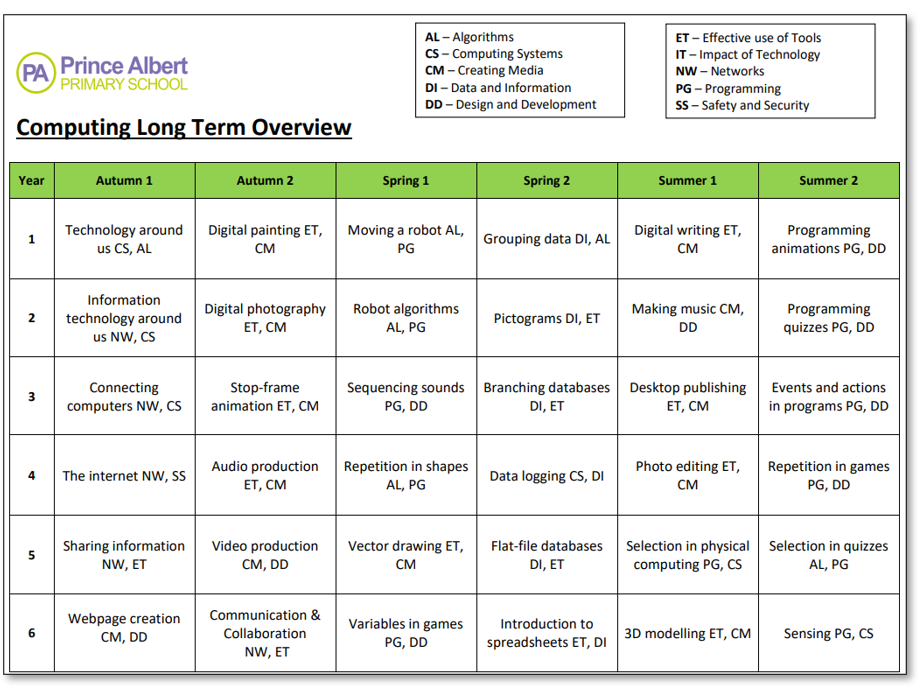COMPUTING
"Computing is not about computers anymore. It is about living” - N. Negroponte

INTENT
Through our computing curriculum at Prince Albert School, we aim to give our pupils the life-skills that will enable them to embrace and utilise new technology in a socially responsible and safe way in order to flourish. We want our pupils to be able to operate in the 21st century workplace and we want them to know the career opportunities that will be open to them if they study computing. It is important to us that the children understand how to use ever-changing technology to express themselves, as tools for learning and as a means to drive their generation forward into the future.
Whilst ensuring they understand the advantages and disadvantages associated with online experiences, we want children to develop as respectful, responsible and confident users of technology, aware of measures that can be taken to keep themselves and others safe online. Not only do we want them to be digitally literate and competent end-users of technology but through our computing lessons we want them to develop creativity, resilience, problem-solving and critical thinking skills.
We provide a computing curriculum that is designed to balance acquiring a broad and deep knowledge alongside opportunities to apply skills in various digital contexts. Beyond teaching computing discreetly, we will give pupils the opportunity to apply and develop what they have learnt across wider learning in the curriculum.
IMPLEMENTATION LONG TERM O VERVIEW
VERVIEW
Our computing curriculum is developed from ‘Teach Computing’ framework and covers all aspects of the National Curriculum. Teach Computing was chosen as it has been created by subject experts and based on the latest pedagogical research. It provides a framework where computing content (concepts, knowledge, skills and objectives) has been planned to ensure progression. Computing is taught weekly across school.
We begin to develop our pupil’s understanding of technology in the Early Years Foundation Stage (EYFS). This is centred around play-based activities that focus on building children’s listening skills, curiosity and creativity and problem solving.
Technology in the Early Years can include:
- Taking photographs
- Using QR codes
- Mark making using technology
- searching for information on the internet
- exploring mechanical toys
- using Beebots, Spheros and VR headsets
Allowing children the opportunity to explore and learn about technology means that not only will they develop a familiarity with equipment and vocabulary but they will have a strong start in KS1.
In KS1 and 2, computing is taught across three main strands: digital literacy, computer science and information technology. As part of information technology, pupils learn to use and express themselves and develop their ideas through Information and Communication Technology (ICT) for example writing and presenting as well as exploring art and design using multimedia. Within digital literacy, children develop practical skills in the safe use of ICT and the ability to apply these skills to solving relevant, worthwhile problems for example understanding safe use of internet, networks and email. In computer science we teach pupils to understand and apply the fundamental principles and concepts of computer science, including abstraction, logic, algorithms and data representation. Also to analyse problems to computational terms, and have repeated practical experience of writing computer programs in order to solve such problems.
Online safety lessons form an important part of this curriculum. Elements of online safety are also included in PSHE lessons and assemblies. Online safety procedures are communicated with all staff and parents. All staff complete online safety training at the start of each year. Parents are informed when issues relating to online safety arise and further information/support is provided as required. Our school has an Online Safety leader who monitors any safety issues and ensures staff and parent have the latest online safety information.
Pupils are provided with opportunities to apply their computing knowledge and skills in design and technology and other subjects such as history, using iPads and VR headsets.
Regular training is provided to staff by the subject leader and teachers receive subject knowledge documents and guidance of where to access further knowledge and sources. All staff also have access to subject specific training as part of our National College subscription. The subject leader attends external training to ensure up-to-date knowledge of advancements in computing.
IMPACT
Our high-quality computing education develops a range of programming and technological skills that are transferable to other curriculum areas, including science, mathematics, design and technology and history. As pupils progress through KS1 and KS2 children become increasingly confident in:
- The application of their digital skills,
- Becoming increasingly efficient and effective communicators, collaborators and analysts,
- Showing imagination and creativity in their use of ICT in different aspects of their learning and life beyond school.
- E-safety and the risks involved when using the internet.
- Having a secure understanding of the positive applications and specific risks associated with a broad range of digital technology.
The impact of the computing curriculum offered at Prince Albert School is assessed continuously against the age-related expectations in computing for each year group. In doing so, we are ensuring that the necessary support is provided for all children to have a good understanding of the primary computing curriculum whilst allowing us to effectively scaffold/adapt learning for pupils.
The computing curriculum is monitored through a variety of monitoring activities such as discussions with pupils, learning walks and monitoring of pupil’s work.
The implementation of this curriculum ensures that when pupils leave Prince Albert, they are competent and safe users of technology with an understanding of how technology works. They have developed skills to express themselves and be creative in using digital media and be equipped to apply their skills in computing to different challenges going forward to secondary school and beyond.
